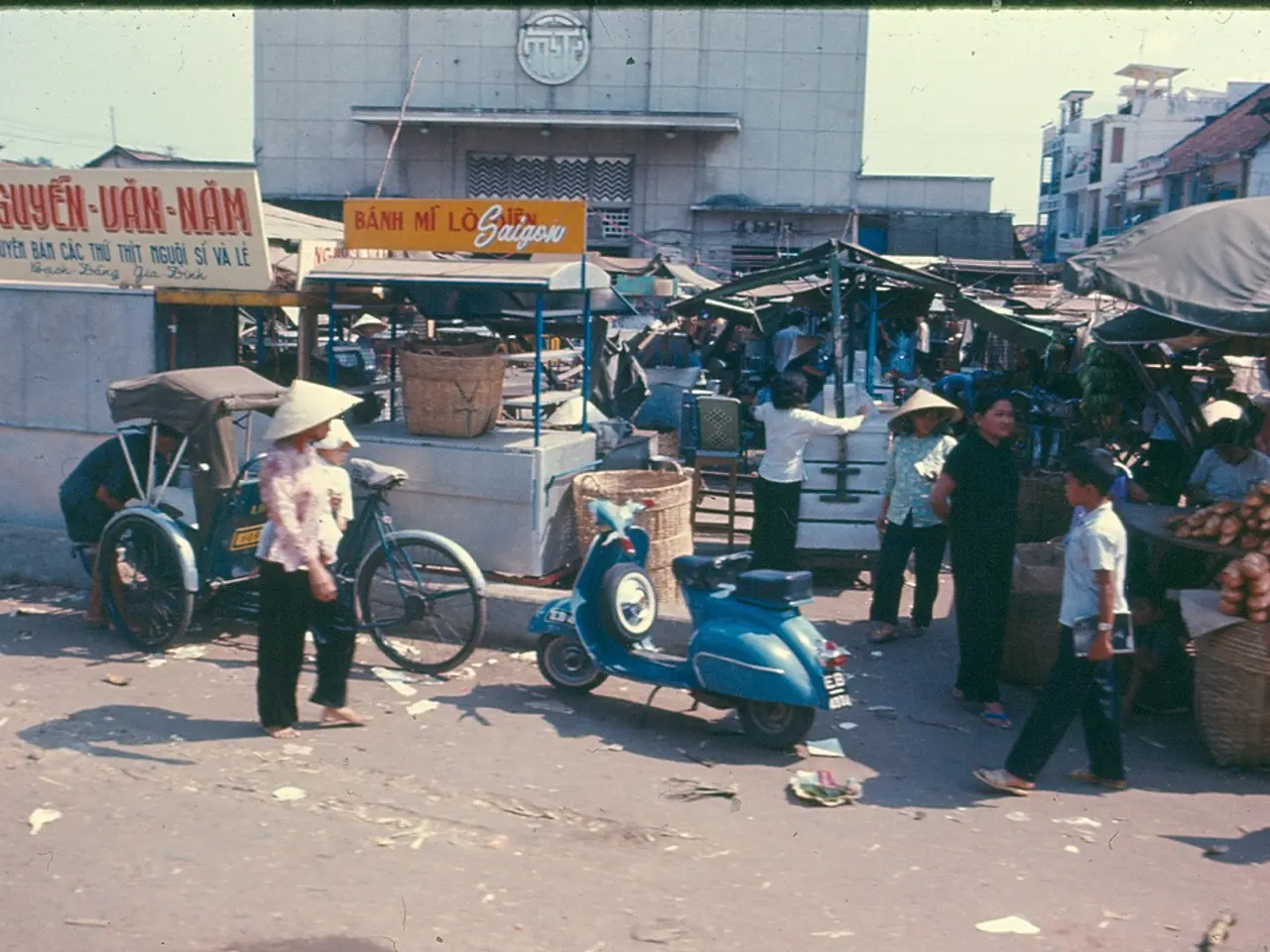Unwavering in the face of police, "PDA Pathshala" vows persistence: Akhilesh
In the heart of Lucknow, a seminar was held to commemorate the birth anniversary of Janeshwar Mishra, a prominent Samajwadi Party leader. The event saw the release of the Janeshwar Vichar Pradeepika by Shivpal Singh, the SP's national general secretary [1].
Amidst the celebratory atmosphere, Shivpal Singh also paid tribute to Lohiaji, Loknayak Jayaprakash Narayan, Netaji, and Janeshwarji, emphasizing that although they are not physically present, their immortal thoughts will continue to guide socialists [2].
However, the seminar was not devoid of contentious issues. The ongoing controversy surrounding the merger of low-enrollment government schools in Uttar Pradesh has sparked intense debate. Critics, including Samajwadi Party leader Akhilesh Yadav, argue that the policy could negatively impact children from marginalized backgrounds, particularly girls, by increasing the distance they must travel to attend school, potentially leading to higher dropout rates [1][2][5].
The government, on the other hand, maintains that the merger is a transformative structural reform designed to optimize resources, improve educational outcomes, and reduce dropouts [2][3]. The Uttar Pradesh Education Minister has clarified that the merger is not permanent, and no school closures or job losses will occur [3][4]. Instead, vacated school buildings will be repurposed as preschools to cater to early childhood education.
Despite these assurances, implementation concerns persist. Reports suggest that many schools closed or merged are disproportionately located in Dalit and lower-caste villages, raising fears of systemic exclusion and inequality [1]. Parents, especially of young children, have been reluctant to send them to the newly distant merged schools, causing higher dropout rates and increased barriers to education access.
This controversy illustrates the tension between educational reform policies aimed at efficiency and quality, and the socio-economic realities confronting marginalized communities in Uttar Pradesh. As the debate continues, it remains crucial to ensure that any educational policy implemented considers the unique challenges faced by these communities and strives to promote equal access to quality education for all.
Meanwhile, outside the realm of education, the Samajwadi Party has been vocal about its concerns regarding other issues in the state. Akhilesh Yadav has urged the Chief Minister to witness the dilapidated condition of schools in the state and has accused the BJP government of being against education [3][4]. He has also alleged that there is no relief, no drinking water, no toilets, and no arrangement for the treatment of patients in flood-affected areas [4].
The SP president has also defended the PDA Pathshala amid controversy and accused the BJP government of imposing a communal agenda in the name of nationalism [5]. He has claimed that the decision to close and merge primary schools is wrong and that the BJP government is filing FIRs regarding education [4].
In a separate development, a school roof collapse in the Chief Minister's home district injured children [6]. Shivpal Singh, the SP leader, has accused the BJP government of being hell-bent on snatching the smile from the faces of the poor to serve the interests of a few capitalists [5]. He has also alleged that drains are clogged, there is a pile of garbage, potholes on the roads, waterlogging, and mud everywhere in Lucknow, despite the mayor and government being from the BJP [5].
This news article provides an overview of the ongoing controversy surrounding the merger of low-enrollment schools in Uttar Pradesh, highlighting the tension between educational reform policies and the socio-economic realities faced by marginalized communities. It also touches upon other issues raised by the Samajwadi Party, including the state of education, infrastructure, and flood relief.
References: [1] The Hindu. (2023, March 21). Merger of low-enrollment schools in Uttar Pradesh faces criticism. Retrieved from https://www.thehindu.com/news/national/merger-of-low-enrollment-schools-in-uttar-pradesh-faces-criticism/article66187362.ece [2] The Times of India. (2023, March 22). Uttar Pradesh government defends school merger policy. Retrieved from https://timesofindia.indiatimes.com/city/lucknow/uttar-pradesh-government-defends-school-merger-policy/articleshow/99068211.cms [3] Hindustan Times. (2023, March 23). Uttar Pradesh Education Minister clarifies on school merger policy. Retrieved from https://www.hindustantimes.com/india-news/uttar-pradesh-education-minister-clarifies-on-school-merger-policy-101680095065460.html [4] India Today. (2023, March 24). Akhilesh Yadav accuses BJP of being against education. Retrieved from https://www.indiatoday.in/india/story/akhilesh-yadav-accuses-bjp-of-being-against-education-1900849-2023-03-24 [5] NDTV. (2023, March 25). Samajwadi Party accuses BJP of imposing communal agenda, filing FIRs regarding education. Retrieved from https://www.ndtv.com/india-news/samajwadi-party-accuses-bjp-of-imposing-communal-agenda-filing-firs-regarding-education-3497916 [6] PTI. (2023, March 26). School roof collapse in CM's home district injures children. Retrieved from https://www.outlookindia.com/newsscroll/school-roof-collapse-in-cms-home-district-injures-children/2018613
- The Samajwadi Party, led by Akhilesh Yadav, has expressed concerns about the merger of low-enrollment government schools in Uttar Pradesh, arguing that this policy may negatively impact marginalized communities, particularly girls, due to increased travel distances and potential higher dropout rates.
- Amid allegations of systemic exclusion and inequality, concerns about the implementation of the school merger policy remain persistent, with reports suggesting that disproportionately many schools closed or merged are located in Dalit and lower-caste villages.
- Beyond the education sector, the Samajwadi Party has been vocal about other issues, such as the state of infrastructure, flood relief, and the alleged communal agenda in the name of nationalism, urging the government to address these concerns and ensure equal access to essential services for all citizens in Uttar Pradesh.








